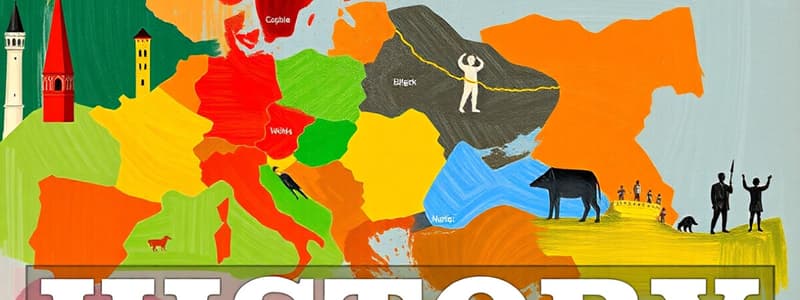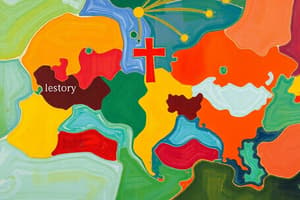Podcast
Questions and Answers
Which era is characterized by the development of tools, art, and early societies?
Which era is characterized by the development of tools, art, and early societies?
- Prehistoric Era (correct)
- Early Modern Period
- Medieval History
- Ancient History
What major event is associated with the period from 500 to 1500 CE?
What major event is associated with the period from 500 to 1500 CE?
- The Industrial Revolution
- The Age of Exploration
- The Renaissance
- The Crusades (correct)
Which term refers to the study of historical writing and methods of interpretation?
Which term refers to the study of historical writing and methods of interpretation?
- Historiography (correct)
- Archaeology
- Anthropology
- Paleontology
What is the primary difference between primary and secondary sources?
What is the primary difference between primary and secondary sources?
Which philosopher is known for developing the concept of historical materialism?
Which philosopher is known for developing the concept of historical materialism?
During which period did the Industrial Revolution take place?
During which period did the Industrial Revolution take place?
What concept involves understanding the causes of historical events?
What concept involves understanding the causes of historical events?
Which civilization is NOT associated with ancient history?
Which civilization is NOT associated with ancient history?
Flashcards are hidden until you start studying
Study Notes
Key Concepts in History
- Definition of History: The study of past events, particularly in human affairs, providing insights into societies, cultures, and civilizations.
Major Periods in History
-
Prehistoric Era
- Time before written records.
- Divided into the Stone Age, Bronze Age, and Iron Age.
- Development of tools, art, and early societies.
-
Ancient History (c. 3000 BCE - 500 CE)
- Rise of civilizations (e.g., Mesopotamia, Ancient Egypt, Indus Valley).
- Development of writing systems (cuneiform, hieroglyphics).
- Major empires: Roman, Persian, Chinese dynasties.
-
Medieval History (500 - 1500 CE)
- Feudalism in Europe; rise of the Byzantine Empire.
- Spread of Islam and the Islamic Golden Age.
- The Crusades and their impact on Europe and the Middle East.
-
Early Modern Period (1500 - 1800 CE)
- Age of Exploration; discovery of the Americas.
- The Renaissance: revival of art, science, and humanism.
- The Reformation: religious reforms leading to Protestantism.
-
Modern History (1800 - Present)
- Industrial Revolution: transformation of economies and societies.
- World Wars: causes, key events, and consequences.
- Cold War: ideological conflict between the USA and the USSR.
Important Historical Concepts
-
Historiography: The study of historical writing and methods of interpretation.
-
Primary vs. Secondary Sources:
- Primary: Original documents, artifacts, or eyewitness accounts.
- Secondary: Analysis or interpretation of primary sources.
-
Causation and Context: Understanding the causes of historical events and the context in which they occurred.
Notable Historians and Their Contributions
- Herodotus: Often called the "Father of History"; wrote "Histories," documenting the Greco-Persian Wars.
- Thucydides: Known for his account of the Peloponnesian War, emphasizing empirical evidence.
- Karl Marx: Developed historical materialism, focusing on economic factors as drivers of history.
Themes in History
- Power and Authority: Examination of governance, empires, and revolutions.
- Society and Culture: The role of religion, art, and social structures.
- Economics and Trade: Impact of trade routes, economic systems, and resources on historical development.
- Conflict and Cooperation: Wars, treaties, alliances, and their implications on societies.
Methodologies in Historical Research
- Chronological Approach: Organizing events in the order they occurred.
- Thematic Approach: Focusing on specific themes or issues across different time periods.
- Comparative History: Analyzing similarities and differences between societies or events.
Importance of Studying History
- Understanding the past helps to inform decisions and policies in the present.
- Provides context for contemporary issues and societal changes.
- Encourages critical thinking and analytical skills through examination of evidence and diverse perspectives.
Key Concepts in History
- History involves the examination of past events, offering insights into human societies, cultures, and civilizations.
Major Periods in History
-
Prehistoric Era
- Marked by the absence of written records; divided into three ages: Stone, Bronze, and Iron.
- Characterized by advancements in tool-making, art, and the formation of early communities.
-
Ancient History (c. 3000 BCE - 500 CE)
- Emergence of complex civilizations such as Mesopotamia, Ancient Egypt, and the Indus Valley.
- Invention of writing systems like cuneiform and hieroglyphics.
- Prominence of major empires, including the Roman, Persian, and various Chinese dynasties.
-
Medieval History (500 - 1500 CE)
- Dominated by feudal systems in Europe and the influence of the Byzantine Empire.
- Significant spread of Islam, leading to the Islamic Golden Age.
- The Crusades notably reshaped relations between Europe and the Middle East.
-
Early Modern Period (1500 - 1800 CE)
- Age of Exploration led to the discovery of the Americas and global trade expansion.
- The Renaissance witnessed a resurgence in art, science, and a focus on humanism.
- The Protestant Reformation caused major shifts in religious practices and beliefs.
-
Modern History (1800 - Present)
- The Industrial Revolution marked a shift in economies, revolutionizing societies.
- Key events of the World Wars shaped international relations and political landscapes.
- The Cold War instigated ideological tensions primarily between the USA and the USSR.
Important Historical Concepts
-
Historiography
- Involves the analysis of historical writing and various interpretation methods.
-
Primary vs. Secondary Sources
- Primary sources are original documents or artifacts; secondary sources analyze those originals.
-
Causation and Context
- Understanding involves identifying causes of historical events and recognizing their cultural, social, and political contexts.
Notable Historians and Their Contributions
-
Herodotus
- Regarded as the "Father of History" for documenting the Greco-Persian Wars in "Histories."
-
Thucydides
- Authored a significant account of the Peloponnesian War with a strong emphasis on empirical evidence.
-
Karl Marx
- Introduced the concept of historical materialism, prioritizing economic factors in historical development.
Themes in History
-
Power and Authority
- Exploration of governance structures, empires, and the nature of revolutions.
-
Society and Culture
- Investigates the influence of religion, artistic expression, and social hierarchies.
-
Economics and Trade
- Examines the significance of trade routes and economic systems in shaping historical progress.
-
Conflict and Cooperation
- Analyzes the impact of wars, treaties, and alliances on societies through time.
Methodologies in Historical Research
-
Chronological Approach
- Involves organizing historical events in sequential order.
-
Thematic Approach
- Focuses on particular themes or topics across various historical periods.
-
Comparative History
- Aims to identify similarities and differences among societies or events.
Importance of Studying History
- Understanding historical contexts can enhance current decision-making and policy development.
- Studying history contextualizes modern issues and societal transformations.
- Encourages critical thinking and the ability to analyze evidence through multiple perspectives.
Studying That Suits You
Use AI to generate personalized quizzes and flashcards to suit your learning preferences.




